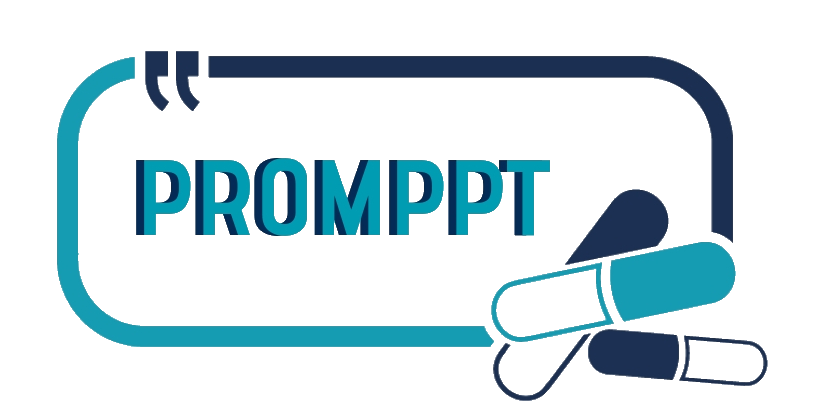PROMPPT is for…
People living with persistent pain
NICE guidelines recommend people with persistent pain who take long-term opioids have regular reviews. This already happens for other long-term conditions such as diabetes or asthma.
PROMPPT is a 5-year research programme that aims to develop and test a new pain review for people who take opioids long-term for persistent pain. The pain review has been co-designed with patients and aims to provide an opportunity for people living with persistent pain to discuss their pain, pain medicines, and other pain management strategies with a specially trained pharmacist at their GP practice.
The proposed consultation will support patient care by :
- providing a routine check-up to discuss pain and its impact on day-to-day activities
- considering how well current medicines are helping relieve pain
- allowing time for any questions or concerns to be discussed about pain and its management
[metaslider id=”6378″]
Below you can find out more information about persistent pain and opioids and about clinical pharmacists who will be delivering the pain reviews.
What is persistent pain?
Persistent pain is pain that has lasted for more than 3 months and is sometimes called chronic pain. Persistent pain means long-lasting pain due to a range of conditions, for example osteoarthritis and back pain, but does not include pain caused by cancer.
What are opioids?
Opioids are a group of medicines used for pain that are related to opium, an extract of poppy seeds. Some opioids are naturally occurring, for example morphine and codeine. Other opioids are synthetic, which means they are made in a laboratory but act in the same way as naturally occurring opioids do. There are different strengths of opioids, from weak to strong, although the strength also depends on the amount taken.
Opioids are often prescribed for persistent pain
Opioids are commonly prescribed to people with persistent pain in the UK. Morphine is the best known opioid and it is a strong opioid; fentanyl and oxycodone are strong opioids too. codeine and dihydrocodeine are weaker opioids. Tramadol and tapentadol are medicines that have a dual action. In part they work like a stronger opioid and in part they work more like an antidepressant. Sometimes opioids are mixed with paracetamol, for example co-codamol, co-dydramol and tramacet.
Opioids taken for persistent pain are most commonly dispensed as tablets and capsules, but there are opioid patches containing buprenorphine or fentanyl. Opioids come in other forms too including liquids, injections and lozenges that dissolve in the mouth or under the tongue, but these are not often used for long-lasting pain. The majority of opioids are prescribed by health care professionals. Small doses of weak opioids (such as codeine), combined with paracetamol can be purchased over the counter without a prescription.
Not all medicines prescribed for persistent pain are opioids
Not all medicines used for pain are opioids, for example paracetamol on its own is not an opioid. Aspirin, diclofenac, ibuprofen and naproxen are taken for pain and belong to a group of medicines called non-steroidal anti-inflammatory drugs (NSAIDs).
Antidepressant medicines like amitriptyline and duloxetine and anti-epilepsy (anticonvulsant) medicines like gabapentin and pregabalin are sometimes prescribed for persistent pain, but none of these are opioids. Diazepam is not an opioid either, it is an anti-anxiety medicine and is sometimes prescribed short-term for painful muscle spasm.
Ask a community pharmacist if you’re unsure whether a medicine is an opioid
Medicines have one chemical or generic name but may have a number of different brand (trade) names, which can be confusing. The generic names of opioids which are prescribed for persistent pain include buprenorphine, co-codamol, codeine, co-dydramol, diamorphine, dihydrocodeine, fentanyl, morphine, oxycodone, pethidine, tapentadol and tramadol. There are many brand names for these medicines too. Your community pharmacist will be able to tell you whether the medicine you are taking is an opioid.
What is a practice pharmacist?
Practice pharmacists are trained as medicine experts and work as part of the GP practice team. They are different from community pharmacists who dispense medicines. Practice pharmacists are clinical pharmacists who carry out consultations with patients and many can also prescribe medicines, just like doctors do.
In recent years, more practice pharmacists have joined the team of health professionals in GP practices, taking on a variety of roles including reviewing medicines, performing health checks (e.g. blood pressure) and helping patients manage long-term health conditions.
The PROMPPT research aims to test whether practice pharmacists delivering pain reviews for people who take regular opioid medicines for long-term pain improves care compared to usual GP care and whether this results in better use of NHS resources.
How do I have a pain review?
The PROMPPT pain review is currently being tested in a clinical research trial and is not yet available outside of the research study.
If you have persistent pain and would like to see a healthcare professional about your pain and your pain medicines, please contact your GP practice.

